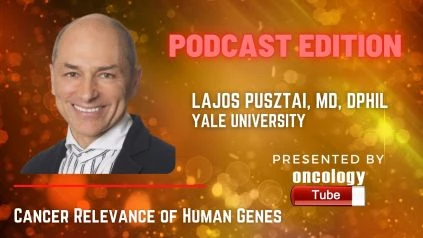Lajos Pusztai, MD, DPhil, Professor of Medicine, Co-Leader Genetics, Genomics, and Epigenetics Program, Scientific Co-Director of the Center for Breast Cancer, Yale Cancer Center. In this video, he speaks about the Cancer Relevance of Human Genes.
Â
Observation –
Â
Origins:
Â
We postulate that genes that interact with core cancer genes (CCG) directly or indirectly in a comprehensive gene-gene interaction network may have functional value in cancer.
Â
Methodologies:
Â
We classified 12,767 human genes into CCGs (n = 468), one (n = 5,467), two (n = 5,573), three (n = 915), and more than three (n = 416) steps distant from the next CCG in the STRING network. We estimated cancer-relevant functional importance in these neighborhood categories using I gene dependency score, which reflects a gene’s effect on cell viability after knock-down; ii) somatic mutation frequency in The Cancer Genome Atlas, iii) effect size, which estimates the extent to which a gene mutation improves cell survival; and iv) negative selection pressure of germline protein-truncating variants in healthy populations.
Â
Outcomes:
Â
The functional relevance of genes in cancer biology reduces as their distance from CCGs increases. Genes adjacent to cancer genes exhibit more network connectivity, are more important in sustaining cancer cell viability, are subject to more negative germline selection pressure, and have a higher somatic mutation frequency in cancer. We provide cancer relevance annotation to known human genes based on these four parameters.
Â
Inferences:
Â
A significant number of human genes are linked to core cancer genes and may influence cancer biology to varying degrees when dysregulated; any one mutation may be functionally important in one individual but not in another depending on genomic context.

